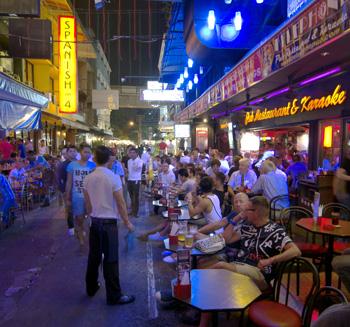
Bangkok's gay dance clubs in the Silom zone are very friendly, unpretentious, welcoming and energetic. Credit: Matt Mills
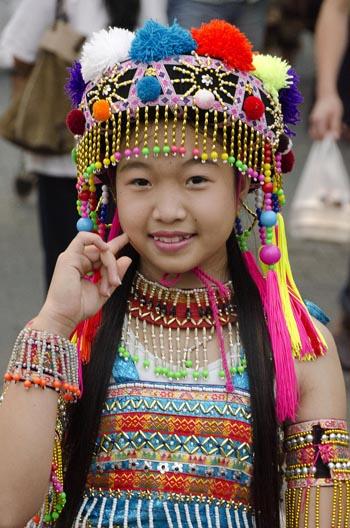
At the Sunday walking market, Chiang Mai. Credit: Matt Mills
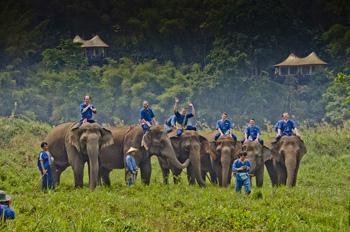
Winding up our time with the elephants at Four Seasons Tented Camp Golden Triangle. Credit: Matt Mills
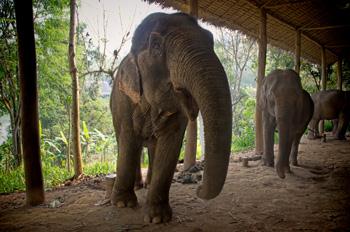
Saying hello before our elephant expedition. Credit: Matt Mills

Visitors to Tiger Kingdom in Chiang Mai can get close enough to the cats to scratch their bellies. Credit: Matt Mills
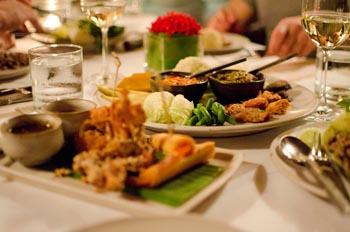
Dinner at Tamarind Village in Chiang Mai: a truly lovely hotel in an idyllic setting. Authentic Thai food at its best. Credit: Matt Mills
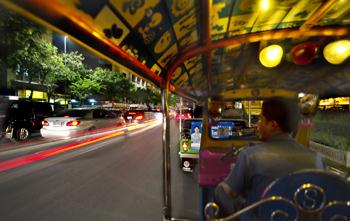
Travelling by tuk-tuk is a quick and inexpensive way to navigate the streets of Bangkok. Credit: Matt Mills
Among the most exciting travel destinations are those where the culture and people seem completely different than they do at home. That is true of Thailand. The memes that define modern Western gay culture — the vocabulary of identity; the symbolism; the architecture and function of social organizations; the tools, mechanisms and expressions of community — really don’t apply, at least not in precisely the same ways. That doesn’t mean Thailand doesn’t have all the accoutrements of gay communities around the world. It’s all just so completely different. There is, for example, a live-and-let-live attitude, absent in the West, that prevails in Thailand.
The culture is such that people are much more likely to be delighted to learn you are a gay man than they are to become wary, defensive or offensive. There is a kind of social conservatism in Thailand, a sort of general discomfort with public displays of romantic or sexual affection among people regardless of gender or sexuality. And public means on the street, not in gay spaces. But it seems most likely that most Thais would turn away from or get the giggles about something they find new or uncomfortable.
Places
Bangkok is a huge world-class metropolis with plenty on offer for every taste. For sightseeing, be sure to visit the Grand Palace, Wat Pho (home of the famous reclining Buddha), and the Jim Thompson House and Museum. Spend some time wandering around Chinatown; you’ll marvel at the skill and beauty on display at the flower market. As hockey is to Canada so muay thai is to Thailand. Plan a visit to Lumpinee Boxing Stadium or Ratchadamnoen Stadium. Check fight times in advance, go early for a good seat, and stay late to see the big boys fight. Look around — some of the most interesting sights and experiences are to be found outside the ring. It really is an integral part of Thai culture and makes for a fascinating spectacle.
Gay-friendly businesses are peppered across central Bangkok, but nightlife is concentrated in the Silom zone. Navigating the city’s dense traffic requires planning, and the best way for gay travellers to take in the nightlife is to select nearby accommodations. The Hotel Muse, Banyan Tree Bangkok Hotel and Sofitel So Bangkok are very comfortable luxury hotels just short tuk-tuk rides away. There are many other hotels of varying rate ranges in the area. If you’re not staying locally, consider arriving via the Bangkok Mass Transit System. Get off at the Sala Daeng Skytrain station.
Once in the Silom zone, wander the Patpong Night Market from sunset. The sounds, sights and shopping are not to be missed. Buy, but start small and learn the local haggling conventions; cash only, final sales. Lose yourself in the neighbourhood until you’re ready to bust loose. After midnight, DJ Station and GOD (Guys on Display) are great places to start. There are party and pub venues for every taste in the Silom zone; just follow your fancy or see a more complete list at dailyxtratravel.com.
The cultural centre of Northern Thailand, the city of Chiang Mai, is a quick 50-minute flight or an all-day rail journey north from Bangkok. The feel of the city is relaxed, artistic expression and collaboration flourishes, and young visitors from every corner of the globe seem attracted to the place. There are lots of temples and sights to be explored, but don’t miss the Sunday night walking market. Stay and eat at Tamarind Village. If you’re looking for unparalleled luxury, the Mandarin Oriental Hotel Chiang Mai is incredible.
Snapshot: Four Seasons Tented Camp Golden Triangle
Riding on Naggi’s neck is a bit like riding a very large, very gentle, very smart horse. She’s an Asian elephant. We’re at the Four Seasons Tented Camp Golden Triangle in northern Thailand, winding our way through a forest toward the banks of the Mekong River. Dozens of brightly coloured butterflies float in the air. A white owl flees from its perch in the trees as we pass below. It’s a jaw-dropping experience of natural beauty that beggars belief.
There are six elephants, six gay journalists and six mahouts — elephant handlers — in our group. The elephants and mahouts have walked this route a thousand times. It’s a workaday thing for them. But each journalist is positively beside himself with wonder, working to stay composed in front of the others. Naggi starts down the steep riverbank without hesitation and with unexpected agility. I lean back flat to avoid falling forward. All six elephants with perched riders wade belly-deep into the river. The opposite bank is Burma. I feel a vibration in my legs. It becomes a rumble, then a sound that rises in frequency to a trumpet. I feel it more than I hear it. These elephants are very excited about being in the water. They hunker down on their bellies. We passengers climb off, waist deep, and splash water over the elephants’ broad backs and faces. They seem to love it. We do.
The bath over, I climb back onto Naggi’s neck. She stands, fills her trunk, reaches over her kitchen table–sized forehead and discharges what feels like gallons of water directly into my face and chest. I lose it, laugh giddily. We return to our starting place, the ride over. I feed Naggi a few sticks of sugar cane as thanks. She looks, with one great beautiful eye, into me for a few seconds. “Meh,” she seems to convey. “I’ve had worse tourists on my neck; you’re okay.” She turns and lumbers off with her mahout.
When you go
The Thai people suffered great economic upheaval at the epicentre of the 1997 Asian financial crisis. Although Thailand’s is one of the fastest-growing and most vital economies in the world, its average per capita annual income is less than $5,000 (Canadian). In 2004, the world watched as a tsunami ravaged the southern coast of the country, killing almost 9,000 people. In 2010, political riots gripped world headlines and effectively closed the country to tourists for weeks. In the last half of 2011, the Thai people faced one of the most widespread and persistent flooding disasters in history. And the Thai people have worked hard to overcome the reputation the country has had in some circles as a destination famous only for sex tourism.
As is too often the case, the world media has reported widely on these matters but has consistently failed to cover fairly the complete realities and the results of recovery efforts. Thailand has not been destroyed by natural disasters, nor does it seem any more dangerous for visitors than any other world travel destination. It’s an illustration of one of many double standards at work: when tragedy befalls a destination in the Western world, travellers don’t seem very quick to write the whole place off. When tragedy befalls more far-flung places, like Thailand, it seems to take more effort to convince Western travellers to return. It’s a shame because visiting a place that is recovering is often the best time to meet people at their best and most engaged. To avoid Thailand because of recent headlines, or because of what you think you know about the place, is to miss out on one of the most amazing and fascinating experiences you’re likely ever to have. It’s wise to conduct some clear-eyed research prior to visiting Thailand. It’s not that gay visitors should steel themselves against hardship; there really is no need to. It’s just that knowing something of the recent history of the place will help you begin to build an understanding of Thai people and culture. As with any destination, the more you know before you go, the more memorable and fulfilling your trip is likely to be.
Thailand is a fascinating and extremely welcoming place for gay travellers. Because of the economic disparity, Westerners of modest means can live long and large there. Even factoring in the flight costs, visiting is a great bargain. It’s startlingly easy to take advantage of myriad personal vulnerabilities in Thailand, so if you have a mean streak, stay home. If you make a point to be extra friendly to and respectful of the people you meet there, you will benefit from immeasurable gratitude and hospitality. Tip early and often. Understand that a thankful gesture or sum that may seem insignificant or inappropriate really isn’t.
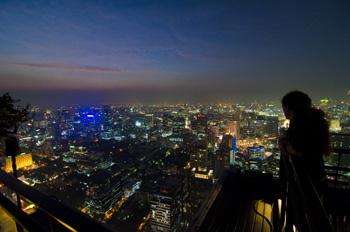
 Why you can trust Xtra
Why you can trust Xtra